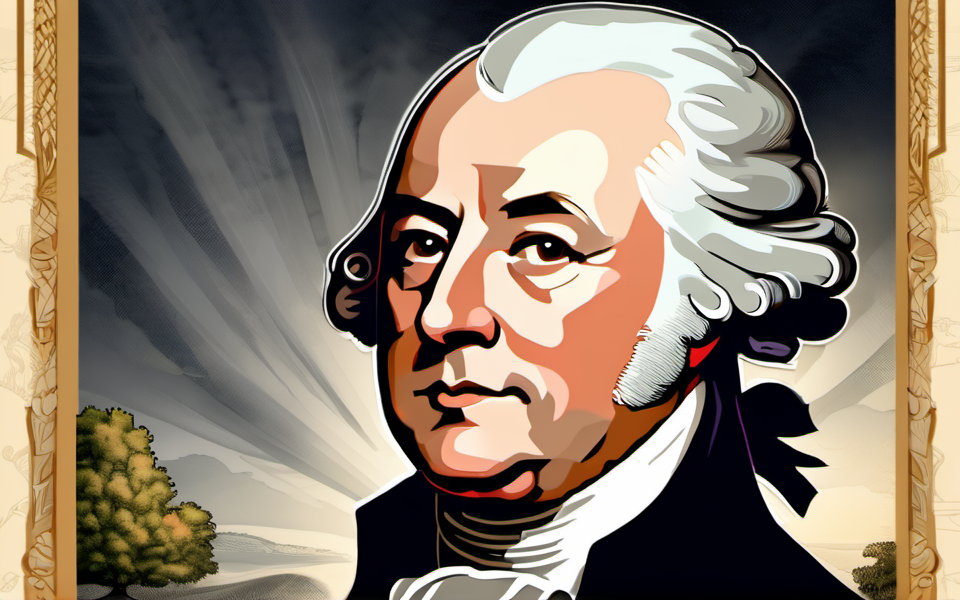Have you ever wondered about the heroes behind America’s founding? Well, grab a comfy seat because you’re about to meet John Adams, the spirited founding father who passionately pushed for independence!
Early Life: A Humble Beginning
Young John and His Family
Born on October 30, 1735, in the small town of Braintree, Massachusetts, John Adams grew up in a modest, hardworking family. His father, a farmer and shoemaker, taught him the value of diligence and education. Young John loved nature and books, sparking a lifelong thirst for knowledge. His mother, too, had a significant influence on him, teaching him the importance of faith and community. Despite the humble beginnings, his parents encouraged him to aim high. This grounding set the stage for his future role in shaping a nation.
The Scholar in the Making
John’s passion for learning led him to Harvard College at just fifteen! Imagine that – off to college when most kids today are just entering high school. His time at Harvard refined his intellectual pursuits and planted the seed for his future legal and political career. He graduated in 1755, but even then, his path wasn’t straightforward. He initially opted to become a teacher, a job that didn’t quite satisfy his ambitions. So, he took a bold step and decided to study law, which profoundly shaped his future as a significant player in American history.
A Voice for Justice: The Lawyer’s Journey
Learning the Ropes
After his decision to pursue law, John Adams quickly made a name for himself. In the mid-1700s, he was navigating the bustling streets of Boston, immersing himself in the vibrant legal scene. His dedication was unmatched – he spent countless hours poring over law books and honing his skills through practice. His hard work paid off, and he soon gained a reputation as a highly capable attorney.
Defending the Unpopular
Adams believed in justice, even when it wasn’t popular. One of his most notable early cases came after the Boston Massacre in 1770, when British soldiers fired into a crowd, killing five colonists. Despite the hatred towards the soldiers, Adams agreed to defend them. Why? He insisted that everyone deserved a fair trial. His brave stance didn’t make him popular, but it demonstrated his unwavering commitment to fairness and the rule of law. His successful defense of the soldiers showcased his talent and integrity, bolstering his reputation and setting the foundation for his political ascent.
Becoming a Revolutionary Leader
The Road to Revolution
The years leading up to the American Revolution were tense and chaotic. John Adams found himself at the heart of the growing resistance against British tyranny. His legal practice put him in touch with other like-minded individuals who were increasingly frustrated by oppressive British policies. The Stamp Act of 1765, which imposed direct taxes on the colonies, was a turning point. Adams fervently opposed the act, viewing it as an affront to colonial liberty. His writings and speeches rallied people to the revolutionary cause, earning him respect as a leader.
Continental Congress and the Push for Independence
By 1774, Adams was a delegate to the First Continental Congress in Philadelphia. Here, he joined other revolutionaries such as Thomas Jefferson and George Washington in a concerted effort to challenge British rule. Adams quickly became a leading voice, advocating passionately for independence. His vision of a free and self-governing America resonated with many. In advocating for the Declaration of Independence in 1776, Adams’s fiery speeches and relentless lobbying were instrumental in swaying opinion. His fervor and eloquence helped unite disparate colonial factions toward the common cause of liberty.
Legacy: The Road Paved for Future Generations
The Second President of the United States
Adams’s influence extended far beyond the Revolution. He went on to become the first Vice President under George Washington and later the second President of the United States, serving from 1797 to 1801. His presidency faced significant challenges, including intense political division and foreign threats. Despite these hurdles, Adams maintained a steady hand and prioritized the young nation’s security and stability. Notably, he avoided war with France through diplomatic efforts, a move that, while unpopular at the time, showcased his commitment to peace.
Remembering John Adams’s Contributions
Though his presidency was often overshadowed by more charismatic figures, John Adams’s contributions to American independence and governance were monumental. He laid the groundwork for the democratic principles that continue to guide the nation. His fierce advocacy for justice, equality, and independence set a powerful precedent. Today, we remember him not only for his leadership and vision but also for his unwavering dedication to the values he cherished. John Adams remains a towering figure whose spirit of independence continues to inspire.






